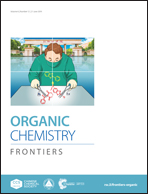Oxidative radical addition–chlorination of alkenes to access 1,1-dichloroalkanes from simple reagents†
Abstract
The oxidative radical addition of alkenes has been achieved using a simple chlorine source in the presence of tert-butyl hydroperoxide under mild conditions. A series of anti-Markovnikov aryl chlorides were obtained in good to excellent yields with a broad substrate scope. Notably, the dichloroaryl compounds were successfully obtained under metal-free conditions, providing an easy method for the direct preparation of 1,1-dichloroalkanes. Furthermore, these reactions were performed in an open flask without inert gas protection, which is favorable for the future scale-up of this synthetic process. The mechanistic study suggested the involvement of a radical pathway.



 Please wait while we load your content...
Please wait while we load your content...